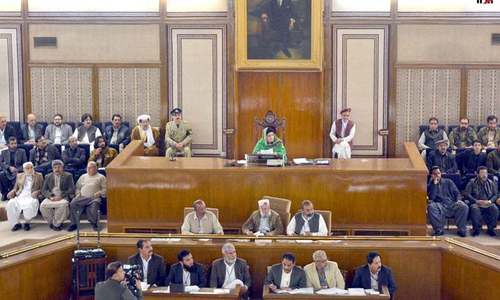NASIRABAD Division has made a significant contribution to both national and provincial politics, producing a prime minister of the country (Zafarullah Khan Jamali), as well as hosting some of the key families in Balochistan politics, including the Jamalis, the Magsis and the Rinds.
Consisting of five districts — Kachhi, Nasirabad, Jhal Magsi, Jaffarabad and Sohbatpur — as per the Election Commission of Pakistan’s new delimitations, the division has two National Assembly seats: NA-260 (Nasirabad-cum-Kachhi-cum-Jhal Magsi) and NA-261(Jaffarabad-cum-Sohbatpur).
As background interviews with journalists and political observers familiar with the region reveal, rather than the ideological leanings or programmes of political parties, what drives the area’s politics is the complex relations between and within Nasirabad’s powerful families and clans, as well as the division’s agricultural economy.
As with many of Balochistan’s other districts, NA-260 covers a large geographical area, stretching from the border with Sindh in the south, to touching Mastung and Sibi in the north. According to figures released by the ECP, Jhal Magsi has a total of 59,106 voters, Kachhi 99,865 while Nasirabad has 206,565 registered voters.
In the 2013 elections, when the seat was known as NA-267 (Kachhi-cum-Jhal Magsi), Khalid Hussain Magsi emerged victorious as an independent candidate with over 42,000 votes. Mr Magsi is back in the run, but this time as a member of the recently formed Balochistan Awami Party (BAP), a collection of the province’s ‘electables’. Other notable contenders include Sardar Khan Rind of the PTI and former provincial minister Asim Kurd, running as an independent.
The Magsis or whoever they nominate [usually] win. They have been dominating since the 1990s. In this region, families tend to patronise different political parties at different times.Journalist Shahzada Zulfiqar
Coming to NA-261, it borders Sindh on the south, and the Balochistan districts of Dera Bugti, Jhal Magsi and Nasirabad on its northern frontiers. As per the ECP’s final electoral rolls, Jaffarabad has 220,511 registered voters while Sohbatpur has 90,271.
Under the 2013 delimitations, the seat was known as NA-266 and was won by former prime minister Zafarullah Jamali (running as an independent) with over 41,000 votes. This time around two major members of the Jamali clan are looking to capture the seat: Khan Mohammad Jamali on a PTI ticket, and the PPP’s candidate, former federal minister Changez Jamali. BAP’s candidate Zahoor Khan Khoso and Mir Hasan Sasoli contesting from the MMA’s platform are said to be the other major contenders, say local journalists.
In NA-260 Khalid Magsi is said to have the edge over other candidates and may recapture the seat as Jhal Magsi is his native area. In NA-261 Khan Mohammad Jamali has Zafarullah Jamali’s backing and considering the former premier’s influence in the area, this may be a significant factor come polling day.
Asked how strong the sardari system was in Nasirabad Division, veteran journalist Shahzada Zulfiqar was of the opinion that since Nasirabad was an agricultural region, fed by canals, landowners were the kingmakers of the area. “The zamindars here are strong. The peasants follow their lead.”
He adds that the Jamalis are perhaps the most influential clan in the region. He says that in this part of the country, the common man has little say; it is mostly the Jamalis and the Khosos that run the show, and therefore shape political trends. The Magsis, on the other hand, will follow the line of their nawab. While Yar Mohammad Rind is said to wield influence, Khalid Magsi may have the edge on polling day.
NA-260 covers a large geographical area, stretching from the border with Sindh in the south, to touching Mastung and Sibi in the north.
“The Magsis or whoever they nominate [usually] wins. They have been dominating since the 1990s”, observes Mr Zulfiqar, adding that in this region, families tend to patronise different political parties at different times.
He observes that the Jamalis are, however, divided, which may affect the results. Yet given Zafarullah Jamali’s political acumen, his kinsman and supported candidate — the PTI’s Khan Mohammad Jamali — may emerge victorious, defeating fellow Jamali, Changez. However BAP’s Zahoor Khoso could exploit the intra-Jamali division and carry the day.
A Quetta-based journalist says that earlier there were rumours that Zafarullah Jamali was going to join the PTI. However, this did not materialise, though the former prime minister is supporting the PTI’s candidate. There were also rumours that PPP supremo Asif Zardari had tried to woo Zafarullah Jamali. This also did not work out as reportedly the former PM wanted to get a ticket for his son Umar Khan Jamali from Sindh.
Observers say considering the area’s agricultural economy, water is a major issue. Famers — especially tail-enders — don’t get enough water and candidates will have to address voters’ concerns on this issue. It is also said that political alliances in the neighbouring districts of Sindh have an influence on Nasirabad’s politics, as many of the tribes and clans have members living in both provinces while Sindhi and Seraiki are spoken widely in this region of Balochistan.
While entirely different issues dominate Pakistan’s urban constituencies, in Nasirabad, not unlike many other rural seats, it is apparently the alliances, spats and deals of the local ‘electables’ and bigwigs that influence the voter. The race in both NA constituencies is expected to be tight on polling day, as the region’s major clans grapple with each other to — once again — make it to the power corridors.
Published in Dawn, July 10th, 2018












































